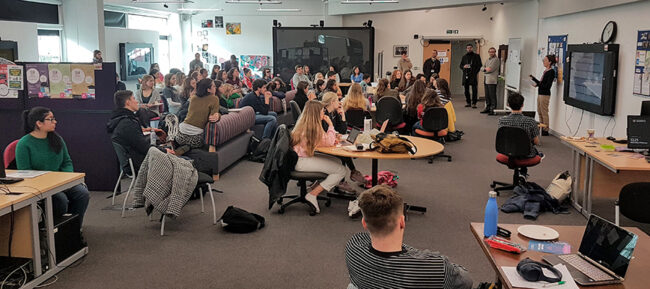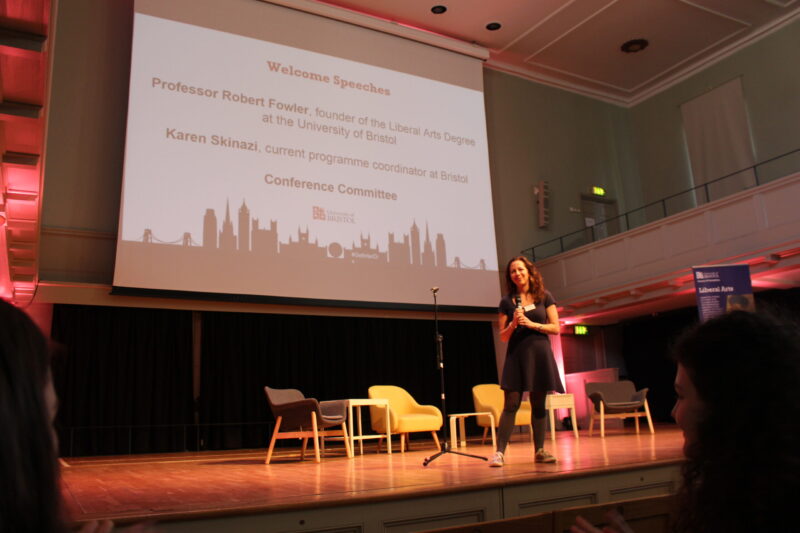In 2000, Northern Ireland was in the process of forging its identity as a post-conflict society. The task at hand was unprecedented – what loomed around the corner for society and politics was intrinsically unclear. What was in no doubt, however, was the fact that every facet of Northern Irish life would now have to navigate a new position for itself in an utterly transformed world.
Higher education, unsurprisingly, was no exception.
“We were looking at what we could contribute within Northern Ireland generally and Belfast in particular in those years after the ceasefire and the Good Friday Agreement”, explains Fr Feidhlimidh Magennis, chair of the liberal arts programme team at St Mary’s University College Belfast.
St Mary’s is a small enough establishment, with just under 1,000 students. But when the small Catholic teacher training college began developing a new liberal arts programme in response to what it saw as the vocational academic needs of an emerging Northern Ireland in the late 1990s, it unknowingly kickstarted a trend that would grip the UK’s higher education sector a decade later.
Over the past 10 years, there has been a surge in multidisciplinary and interdisciplinary undergraduate courses on offer across the UK that cover four key areas: the natural sciences, social sciences, arts and humanities.
How do you make yourself different to just anybody on the street who can Google stuff?
In 2012, University College London (UCL) set up the UK’s first Arts and Sciences programme, with the University of Birmingham launching its own version – Liberal Arts and Natural Sciences – in 2013. In the years since, universities at Bristol, Leeds, Nottingham, Exeter, Sussex and Durham have followed suit with their own, more humanities-focused take on the liberal arts course.
“There’s a pushback against narrow thinking”, explains Dr Karen Skinazi, the director of the liberal arts programme at University of Bristol. “There’s a recognition that different kinds of thinking will help with the future – whatever may be”.
But where does the pushback stem from? According to Prof Diana Spencer, the dean of the Liberal Arts and Natural Sciences programme in the University of Birmingham, it’s symptomatic of our times: “We are living in a world where the lure of universal knowledge is very seductive – we can all Google stuff, we can all become experts in immunology through Dr Google or whatever.”
“So how do you make yourself different to just anybody on the street who can Google stuff?”, she asks.
A silence hangs in the air as I desperately await the answer to a question that I have been asking myself since starting college. I’m tempted to ask Dr Google.

“Well”, she replies, “you undertake a programme of study that actually gives you hard qualifications in a range of key areas”.
Put like that, the answer seems so simple, if not incredibly obvious. But it seems that something unique distinguishes these new courses from any other casual effort to draw together previously separated bodies of knowledge.
“They give people a language with which they can try to negotiate interdisciplinarity”, explains Prof Tim Jordan, who will be taking over as director of UCL’s Arts and Sciences programme in June. Jordan’s own research interests span across a number of disciplines: he’s worked on studies relating to social movements and protests as well as the internet and digital technologies. Jordan says that although programmes like UCL’s can be seen as a “challenge to the intimacy of each discipline”, they are anything but.
“There’s often a lot of incomprehension between different disciplines”, he says. “Most people are trained in particular kinds of methods, ethics and particular institutions. “Interdisciplinarity recognises that, but it puts that training in conversation with that of another discipline or multiple other disciplines.”
The directors of programmes at St Mary’s, UCL, Birmingham and Bristol are all eager to stress the centrality of the “core module” structure to the ethos of their courses – and their success.
There is no one definition of interdisciplinarity. It’s not a thing that you can put boundaries on, it’s a way of life, it’s a way of thinking
In UCL, the degree is split 50-50 between core modules and pathway modules. Usually themed, the core modules are underpinned by interdisciplinarity, and bring together students from each strand of the programme in order to foster a sense of course identity and create an intellectual meeting point at which students’ specialised studies can coalesce.
For Spencer, the ethos of interdisciplinarity and multidisciplinarity is “about recognising that nobody can be an expert in everything, that there is no universal knowledge that somebody can grab hold of”. It is in the core modules that Birmingham’s Liberal Arts and Natural Sciences students are required to take that “the ethos is most concretely evidenced”, she says.
“In the core modules students have to learn how to step back from those disciplinary identities”, Spencer says. The modules clear the space, she says, for students “to explore what happens when you look for the kinds of new knowledge that emerge outside of disciplinary intersections”.
Although the general thrust of the vision – bringing the disciplines into conversation with one another and equipping students with the necessary tools to translate information across different disciplines – is consistent across the universities, outside of their commitment to the core-module curriculum, it has manifested itself in markedly different ways.
“There is no one definition of interdisciplinarity”, Spencer admits by way of explanation. “It’s not a thing that you can put boundaries on, it’s a way of life, it’s a way of thinking.”

It’s no wonder then, that no two of these programmes are the same – their approaches to interdisciplinarity (and multidisciplinarity in the case of St Mary’s) testify to the fluidity and adaptability that the ethos proffers.
Most notably, although the programmes offered at UCL and Birmingham have brought the arts and sciences together, the likes of St Mary’s and Bristol have focused solely on bringing the humanities subjects together (though Bristol has introduced a mandatory data course for its students).
There seems to be more exceptions than rules when it comes to bringing the disciplines together – but it seems this is a by-product of the fact that these programmes are sculpted by society’s changes. With students able to study chemistry, economics and gender studies all at once, adaptability is necessarily built into the course.
Already, UCL is considering introducing an interdisciplinary health MA, while Birmingham, St Mary’s and Bristol have all introduced courses related to climate change and sustainability in recent years. They see themselves as existing in service to society’s demands, and redrawing the lines between academia and the outside world.
“There’s now this recognition that a lot of the older rules have just stopped applying and that we have to start thinking a little bit bigger and a little bit more broadly”, Skinazi says of the growth in popularity of Bristol’s liberal arts programme.
There’s now this recognition that a lot of the older rules have just stopped applying and that we have to start thinking a little bit bigger
“When we prepare our students we’re thinking: ‘What is important?’”, says Skinazi. “And the thing is, we don’t know! We’re not in the future!”.
“We couldn’t envision the present day we are currently living in three months ago”, she points out, addressing the coronavirus-shaped elephant in the room.
Accordingly, the liberal arts programme at Bristol is geared toward illuminating this fact – the unknowability of what lies around the corner – and aims to prepare its students to be adaptable, flexible and unflappable.
Spencer says this is what employers are searching for in an uncertain world. “A lot of companies and employers are finding that they want creatives”, she says. “They want people who recognise how to make the best of what you’ve got rather than asking for something new.”
In an age unstinting in its surprises and more interconnected than ever thanks to technology and rapid globalisation, the rounded and multi-dimensional training of the Arts and Sciences and liberal arts student is more appealing than ever.
According to Dr Graham Woodgate, the acting director of UCL’s Arts and Sciences programme, “our students are amongst the quickest to find graduate level employment or go onto postgraduate study within the university”. But this shouldn’t really come as a surprise, considering the motives that spurred on the rebirth of the course: to produce a path of study that is constructed in such a way as to respond to the volatility and the needs of society.
There’s a pushback against narrow thinking. There’s a recognition that different kinds of thinking will help with the future – whatever may be
Fr Magennis of St Mary’s says that at the end of the 1990s the college was asking itself: “What is our contribution going to be to the new society that is emerging?”
On the cusp of the 2020s, it seems that educational institutions around the world will have to ask – and answer – similar questions. Already grappling with the financial fallout of coronavirus, universities are being forced to re-evaluate their position and their purpose in a world utterly different from what came before.
So might Irish universities follow the lead of their British counterparts? “The arts and the humanities programmes in the south have preserved something of the liberal arts approach much longer than it’s survived in England or here in the North”, says Magennis. “Liberal arts will emerge once again”, he says, though how and in what form, he doesn’t venture to guess.
Trinity’s new joint-honours system bodes well, with college recently adding law, political science, computer science and linguistics to the list of available subjects for study as part of a combination. But if the UK’s rapid advance in Arts and Sciences degrees and liberal arts programmes is anything to go by, a more robust infrastructure may be in order to secure academic and professional dividends.
The liberal arts student, as Skinazi puts it, “can be anything when they graduate”. In a rapidly changing world, it might be up there with the best attribute a student can have.







